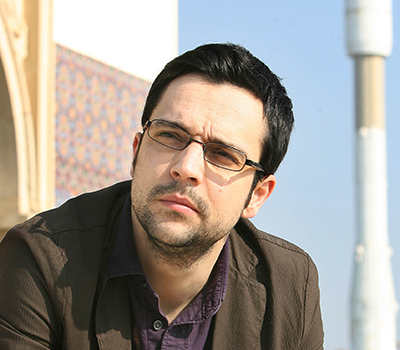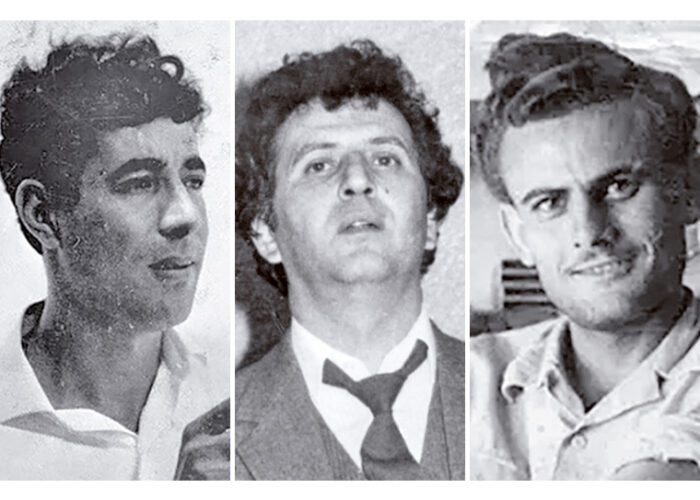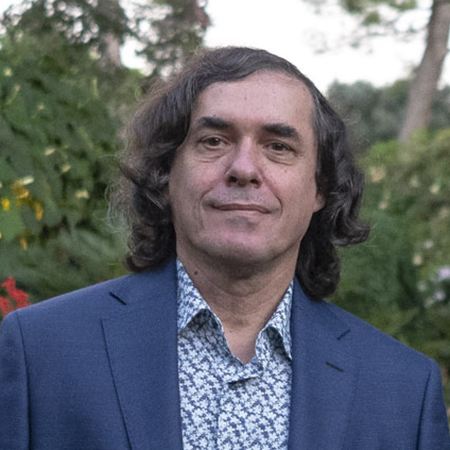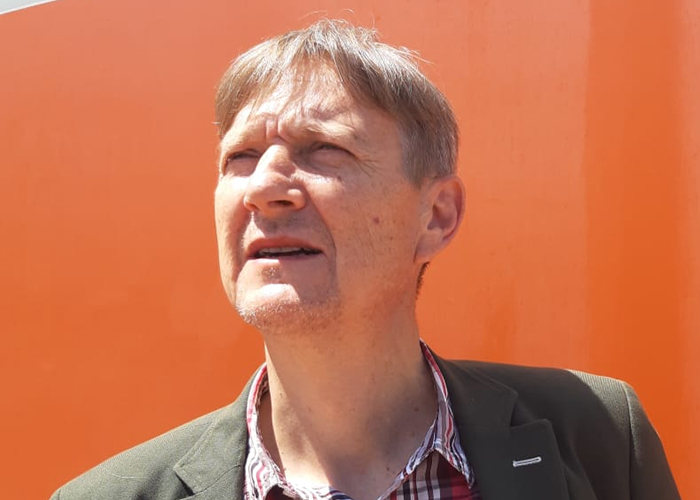Igor Stiks
Carta a Europa
M'Sur
Desde donde la Historia

© Jonathan Palanco
Desde Sarajevo, Europa acaso sea más Europa. Es decir, más necesaria. No solo porque está precisamente en el corazón del continente, exactamente a mitad de camino entre Edimburgo – donde el croata Igor Stiks (Sarajevo 1977) ha vivido y trabajado unos años – y el lugar donde el siempre salidorro Zeus llevó a su amante: la isla de Creta. (Si ustedes insisten que el continente llega hasta Islandia, hacemos la cuenta calculando desde la playa de donde era nativa la princesa Europa: Sidón en Líbano, donde la niña estaba jugando en la playa con las cañaíllas, esas sin las que no habría reino fenicio ni su hermano inventara el alfabeto. Para que vean lo que vale una caracola).
Pero además, es en esa tierra de Balcanes, tan mediterránea en sus playas y tan boscosa, casi nórdica, en su interior, donde se ha forjado buena parte de la Historia del continente, patria o destino de legiones romanas y galeras venecianas, jenízaros otomanos y anarquistas austrohúngaros. Y, triste es admitirlo, también de francotiradores al agonizar el siglo XX y yihadistas al nacer el XXI. Desde Sarajevo, si hay una vía para no morir en la próxima, se llama Europa. Con todo lo que este nombre conlleva hoy día de proyecto político y social.
Stiks, criado en Zagreb, estudiante en París, trabajador en Escocia y – de momento – profesor en Belgrado, autor de libros como Un castillo en Romaña (Funambulista, 2006) y La silla de Elías (Destino, 2008), desde luego es quien para escribir una carta a Europa.
Publicada por primera vez en 2011 en Letters to Europe, un proyecto sueco-alemán-belga-catalán-noruego-británico, el poema ha sido cedido por su autor a M’Sur para publicarse en la revista Caleta en 2015, en traducción de la periodista sevillana Ángela Cañal.
[Ilya U. Topper]
···
Carta a Europa | |
···Querida E. Cada vez que pienso en ti, en mi cabeza arranca un eslalon paralelo. Los nombres de los competidores me gustan y me disgustan al mismo tiempo, en un evento deportivo de resultado impredecible, porque parece no tener fin. Estamos destinados a estar juntos, a continuar con esta tarea de Sísifo, a subir y bajar la misma ladera, siempre en dos pistas. Es una carrera que puede recorrerse de derecha a izquierda, de una línea a otra, y viceversa, de izquierda a derecha, de lo que nos gusta de ti a lo que no. Las marcas que esta corriente paralela de pensamientos deja tras de sí tienen la forma de una oda y de un lamento, y también se pueden leer en ambos sentidos. Ambas son igualmente válidas. Sólo el contenido, las banderas a lo largo de la pista y el estilo de esquí cambian con el tiempo. Así que toma asiento entre el público. ¡Preparados, listos, ya, Europa! ··· | |
| Me gusta… creer que desde tu interior podemos hacer cambios que nos afecten no sólo a nosotros, sino al resto del mundo. tus capitales, cuando sus nombres suenan como una vez lo hicieron Babilonia y Alejandría tus revoluciones y tus Bastillas derribadas pensar que el espacio europeo realmente no tiene fronteras, aunque aún no hemos alcanzado ese objetivo ¡tu fútbol! cómo te echo de menos cuando estoy en América la idea de que eres un continente abierto, de que tus fronteras no están limitadas por mares o cordilleras contemplar la telaraña que han creado tus ríos, como líneas en la palma de la mano. A través de ellas, siguiendo el Rin y el Danubio, podemos leer tu destino que hayas perdido todos tus imperios en otros continentes: deberías haberte quedado en casa que pensamos en ti con más intensidad y te sentimos con más fuerza cuando vivimos en tu periferia: lugares orientados hacia otros continentes, como Constantinopla, San Petersburgo, Edimburgo, Sicilia o Córdoba que tus auténticos representantes son quienes no pueden llamar suyos ninguno de tus rincones, porque se sienten en casa en todas tus partes: todos esos nómadas, mestizos, híbridos, viajeros, personas sin país, políglotas y romaníes que podemos imaginarte sin estar nunca seguros de lo que de verdad eres, del significado de tu nombre, o incluso de lo que se supone que eres… y que te reconocemos, oh, tan bien, en el momento en que te dejamos atrás que puedes acoger a millones de personas y aun así ellos se sentirán como en casa que te conozco, aunque tú nunca me conocerás realmente. Supongo que será por tu falta de interés, tus prejuicios, tu insolencia y tu idea (históricamente equivocada) de que tu centro está en el Noroeste. seguir encontrando algo de ti en todas partes del mundo, y encontrar también el mundo en ti. No como una parte independiente de tu paisaje, sino como algo inseparable, sin lo que, hoy, no tendrías valor que tu mejor literatura es europea. ¿Cómo podría acaso escribirse de forma nacional? el combate a puño limpio que libro contigo, en el que los puñetazos que nos lanzamos son tan feroces como los abrazos esas cosas tuyas, incluso cuando me recuerdan a cosas que no me gustan especialmente | No me gusta… tu arrogancia e indiferencia hacia la pobreza, no sólo dentro de tus fronteras sino más allá esos ejes ficticios Norte-Sur, Oeste-Este que convierten parámetros geográficos en actos del destino la creación de muros visibles e invisibles en tus fronteras, o dentro de ellas que la fragmentación es a menudo el resultado de tus métodos de unificación cuando divides las cosas entre ‘viejas’ y ‘nuevas’ los mitos sobre tus orígenes: son inútiles que hayas saqueado la mitad del mundo y exhibido el botín en los museos de tus grandes ciudades. Esos objetos son hoy el testamento de tu desvergüenza, y la naturaleza deshonrada de tu nombre que dejes a la gente ahogarse junto a tu orilla que la UE es tu sinónimo, porque aún pienso que eres algo más que eso tu nacionalismo, ése que presume de europeísmo que hayas traicionado tanto a la República Española como a Sarajevo. cuando lo sometes todo a las fuerzas del mercado: no siempre fue así los cascos brillantes de tus conquistadores en las laderas de los Andes cuando das la espalda a las costas del Sur del Mediterráneo, a pesar de que el Mediterráneo es imposible de dividir que incorporaste al mundo el concepto de los campos de concentración cuando intentas definirte a ti misma. Cuando intentas determinar quién, o qué, tiene el derecho de ser europeo (o no) y qué significa ser ‘no europeo’. cuando tus gobiernos se arman para defender a sus elites de personas como nosotros cuando mi compañero de viaje va a la cola de la UE y yo voy a la señalizada como ‘Otros’ y tiene que esperarme cuando te consideras el centro, mientras en todo momento no eres más que un estrecho cabo que ‘el corazón de las tinieblas’ sea siempre otro, esté en otro lugar cuando sólo tengo pensamientos negativos sobre ti. Y entonces tengo que volver al principio y buscar otro camino. Pienso en estas cosas que, en realidad, me gustan… |
Todo tuyo, Yo
| |
···
Letter to Europe | |
···Dear E. Every time I start thinking about you, a parallel slalom starts in my head. I both like, and dislike, the names of the competitors in this sporting event, the result of which is unpredictable because, it seems, there is no finish to it. We are destined to be with each other, to pursue this Sisyphean task of climbing and descending the same hillside, always in two tracks. This is a run that one can follow from left to right, from one row to the other or the other way around, from right to left, and from what we don’t like to what we do like about you. The marks that are left behind by these parallel streams of thought are shaped as both an ode and a lamentation, and can be read either way. Both streams are equally worthy. Only the content, as well as the flags down the run and the style of skiing change with time. So, take your place in the audience. Ready, set, go – Europe! ··· | |
| I like… to believe that from inside you we can make changes that will affect not just us but the rest of the world. your capital cities when their names sound like those of Babylon and Alexandria once did. your revolutions and torn down Bastilles. to think that the European space is truly without borders, although we still haven’t achieved that goal. your soccer! the way I miss you when I’m in America. the idea that you are an open continent, that your borders are not limited by seas or mountain ranges. to see the web that your rivers have created, like lines on the palm of a hand. From these, following the Rhine and the Danube, we can read your destiny. the fact that you have lost all your empires on other continents; you should have stayed at home. the fact that we think about you most intensely, that we sense you most strongly, when living onyour edges – the places that are already turned towards other continents, like Constantinople, St Petersburg, Edinburgh, Sicily or Cordoba. the fact that your true representatives are those who cannot call any of your corners their own, because they are at home in your entirety: all those nomads, mongrels, hybrids, travellers, people with no country, polyglots and Romanies. the fact that we can imagine you, never sure of what you really are, what the meaning of your name might be, or even what you are supposed to be… and the fact that we recognise you, oh so well, the moment we leave you behind. the fact that you could embrace millions of people and that they could still feel at home. the fact that I know you, even if you will never truly know me. to keep finding a part of you everywhere in the world, as well as finding the world within you – and not as some independent part of your landscape, but as an inseparable part of yourself without which you would, today, be worthless. the fact that your best literature is European. How could one write nationally, anyway? the bare-knuckle boxing match I have with you, where the punches we throw at each other are fierce, just like the hugs. these things about you, even when they remind me fo things that I don’t particularly like… | I don’t like… your arrogance and your indifference towards abject poverty, not just within your boundaries, but also beyond them. those ficticious North-South, West-East axes, that turn geographical parameters into acts of fate. the creation of visible and invisible walls at your borders, or within yourself. the fact that fragmentation is often the end result of your unification methods. it when you divide things into ‘old’ and ‘new’. the myths about your origin; they are useless. the fact that you have looted half of the world and displayed the bounty in big-city museums. Today these objects are a testament to your shamelessness and the compromised nature of your name. the fact that you leave people to drown near your shores. the fact that EU is your synonym, because I still believe that you are something more than that. your nationalism, the one that boasts about Europeanism. the fact that you betrayed both the Spanish Republic and Sarajevo. it when you subject everything to market forces – it wasn’t always like that. the shiny helmets of your Conquistadors on the slopes of the Andes. it when your turn your back to the Southern coasts of the Mediterranean, in spite of the fact that the Mediterranean is impossible to divide. tha fact that you gave the world the concept of concentration camps. it when you try to define yourself. When you try to define who, or what, has the right to be European (or not) and what is meant by ‘non-European’. it when your governments arm themselves in order to defend their elite from people like us. it when my travelling companion goes to the EU queue and I go the one marked ‘Others’ – and then he has to wait for me. it when you think of yourself like a centre, while all the while you are nothing but a narrow cape. the fact that the ‘heart of darkness’ is always someone else, somewhere else. it when I only think negative thoughts about you. Then I have to go right back to the beginning and choose another track. I think about those things that, when I hear your name I actually do like… |
Yours, I
| |
·
© Igor Stiks | Traducción a partir del original inglés: © Ángela Cañal [Primero publicado en Caleta, Diciembre 2015]



